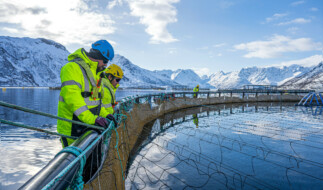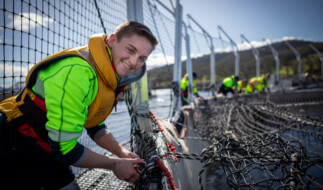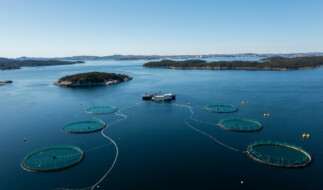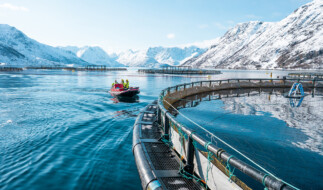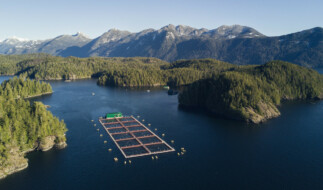Responsible Salmon Farming: What it Means to be ASC Certified
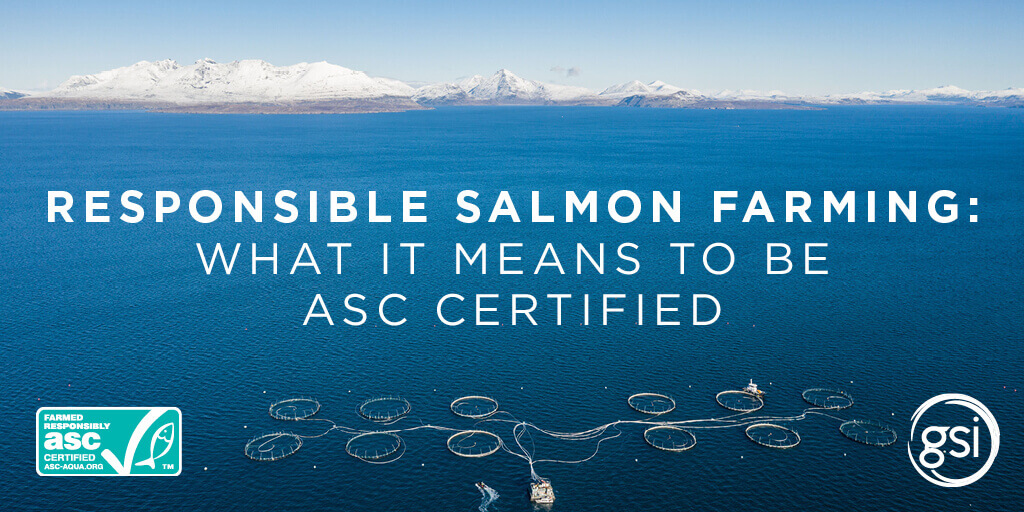
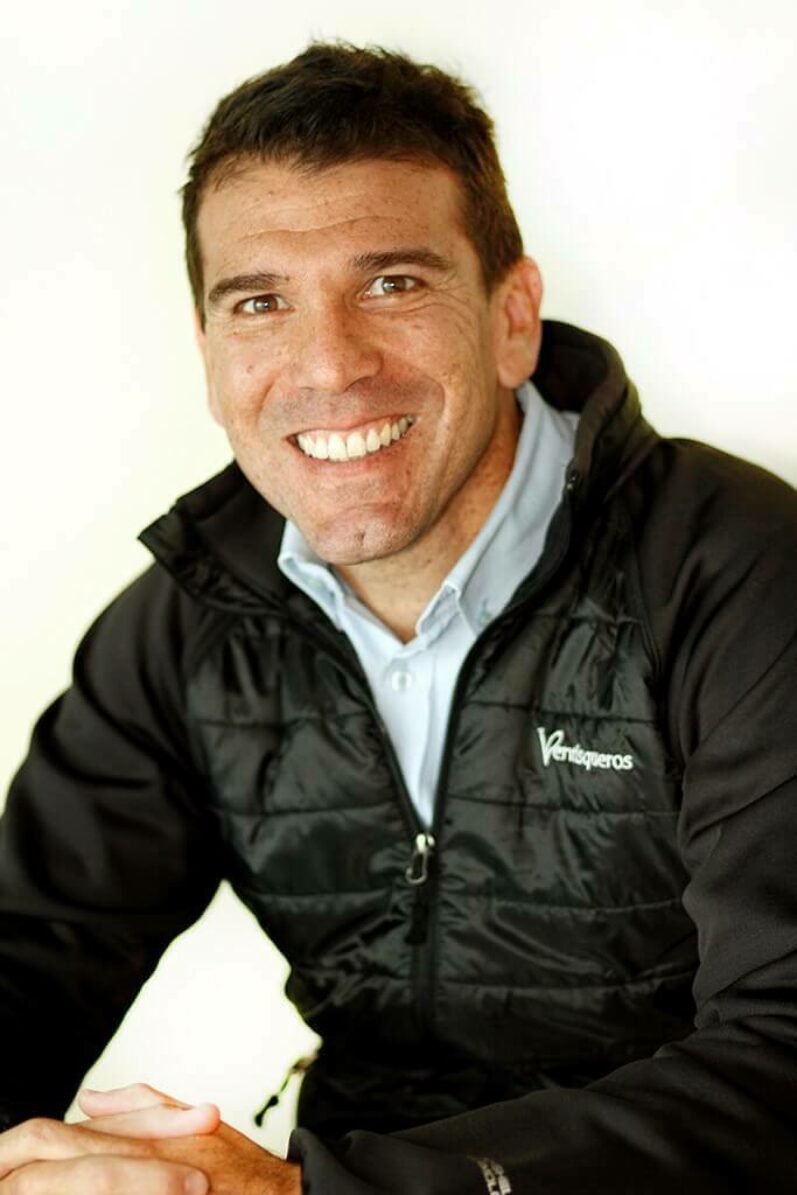
The role of certification
Pablo Mazo, Regulation, Environment and Certification Team Manager, Ventisqueros
Certification has become an integral part of the seafood industry as companies look to provide their customers and wider society with the assurance that they are operating in a responsible manner as well as providing a high-quality product. There are many certification schemes out there, and it was important for the GSI to choose one that went beyond a ‘business as usual’ approach. We needed to select a standard that would challenge all of us to make the significant improvements needed to get our industry to where we want it to be – a sustainable food production sector – now and in the future.
GSI members chose the ASC Salmon Standard – developed through a long, open and diverse stakeholder dialogue, and with 119 indicators covering environmental, fish health, economic and social performance, it is regarded as the most challenging and all-encompassing standard to meet. Plus, like the GSI, securing and maintaining ASC certification is based on the principle of continuous improvement, meaning that once certification has been achieved, farms are motivated to continually further improve performance, and stay at the forefront of best practice. When GSI launched, all members committed to achieving 100% ASC certification across their farms. At that time, no salmon farm was certified and we knew it was going to take significant effort to get us there, but as a collective we knew it was necessary if we wanted the aquaculture industry to be regarded as a sustainable and responsible food provider.
ASC certification is an important component of salmon farming because it combines the latest knowledge, scientific research, and industry best practice to provide clear direction on what is required for each element of salmon farming. From fish health management to employee safeguarding, it provides guidelines for our operations, supporting us to achieve and maintain the highest standards.
Of course, another key reason we chose to become ASC certified was to provide assurance to our customers and local communities that we are operating responsibly, and that our farmed salmon meet all the requirements for a healthy and sustainable product. Having this level of third-party validation and independent review brings a confidence that we wouldn’t be able to credibly provide through our own reviews. Once a facility achieves the ASC Standard, we believe that it becomes distinct and different from a non-certified one. To achieve and secure ASC certification is challenging and demanding, but it demonstrates that aquaculture can be managed in a more responsible and sustainable way.
Certification will no doubt continue to play an important role in driving the farmed salmon industry to improved sustainability and at the same time, as we work towards 100% certification, we can feel proud we are moving our operations in the right direction for a more sustainable future.
What does it take to achieve ASC certification?
Richard Finch, Sustainability Manager, Cermaq Canada
Achieving ASC certification is not an easy task – it’s complex, time-consuming, and takes a lot of resources. For our company, it’s definitely a significant investment and a steep learning curve as we understand and implement the necessary procedures. But over time we’ve come to realize that the investment is worthwhile, because it’s really forced us to take a deep look at how we do things, and see where we can make changes that will not only improve our sustainability performance, but also make us a more efficient company.
At first, working towards ASC certification was quite a daunting prospect and it took us some time to fully understand exactly what was involved; after all, we did choose the toughest and most stringent certification process out there! The ASC Salmon Standard has 7 Principles, 36 criteria and 119 indicators, for all of which we had to generate data to support certification; and we continue to do this for each and every farm. The data we collect are then subjected to an in-depth audit from a third-party certification body, in a process that can take up to 4 months from start to finish. On the plus side, data collection has had a significant and positive influence on our processes; we’ve implemented new reporting measures across all our farms to ensure we meet the requirements of the ASC Standard and, from these data, we’re now able to better track each farm’s performance and make changes more quickly as we see trends appearing.
The GSI’s commitment to achieve the ASC Salmon Standard has also increased the level of transparency and commitment to stakeholders for Cermaq Canada and across the salmon farming industry. Not only are all of the ASC farm audits posted on its website, but as a GSI member we’re also committed to transparent reporting of key data points through the GSI Sustainability Report.
Cermaq Canada is committed to supporting the United Nations Sustainability Development Goals (SDGs) and the UN Global Compact Sustainable Ocean Business Action Platform. There are five UN SDGs that we consider core to our business: #2 Zero Hunger; #8 Decent Work and Economic Growth; #12 Responsible Consumption and Production; #13 Climate Action and, of course; #14 Life Below Water. These SDGs are incorporated in all of Cermaq’s operational processes and are core to our business, and as a result, certification to the ASC Salmon Standard contributes to our efforts to support the SDGs.
In order to achieve ASC certification, there were two key areas on which we really had to focus efforts to achieve the Standard’s sustainable aquaculture requirements. The first was the use of marine ingredients in the feed and, through close partnership with our feed suppliers, the industry has been able to innovate and improve its feed efficiencies to reduce the fish-in-fish-out ratio to almost 1:1. Additionally, the replacement of fish meal and fish oil derived from targeted capture fisheries with alternative sources – such as trimmings from other responsible fisheries that would have otherwise gone to waste – has reduced pressure on these targeted fisheries. The second key area was medicinal use in farmed salmon. Cermaq has developed more tools in an integrated management process for controlling sea lice. A major development is an investment in the Salar, a working barge that incorporates technology to detach lice from fish and collect them for disposal. This equipment will reduce dependence on chemical treatments, increasing their effectiveness over the long term while promoting responsible management of sea lice on our farms to reduce impacts on wild salmon. There’s no doubt that the salmon industry would have worked on these innovations with or without striving for ASC certification, but by having a benchmark for what is considered responsible production, this has definitely prompted our farms into action.
We knew that achieving our goal of 100% ASC-certified salmon farms was going to be difficult, so within the GSI, we have a dedicated ASC taskforce through which all the companies actively engage to solve problems collaboratively and share experiences on achieving ASC certification, and this has been incredibly helpful.
It definitely takes a lot of investment in time and resources to bring all production up to the ASC Standard, but the process is highly rewarding, especially when we successfully achieve ASC certification and we know we are producing salmon to the highest environmental and social standards.
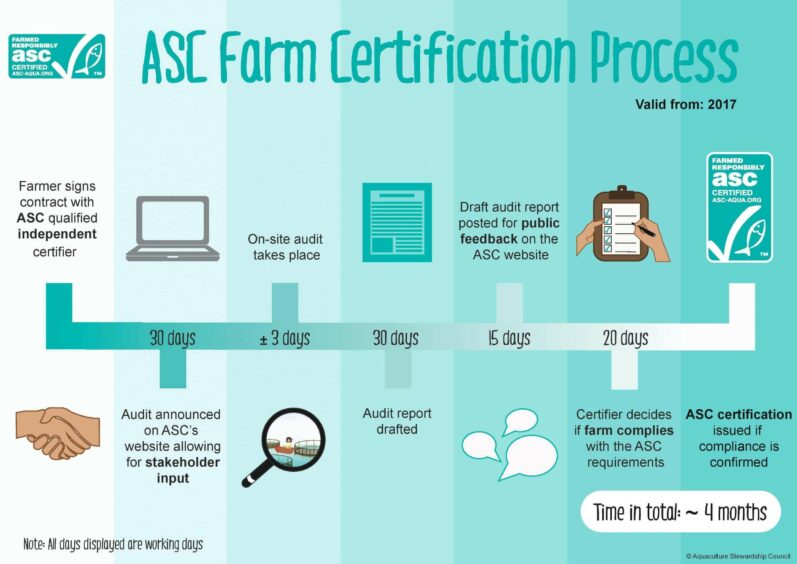
What are the benefits of ASC certification?
Samuel Anderson, Environmental Advisor, Nova Sea
The process of certification offers many benefits, not just for the environment, but also for us as companies and for consumers.
Firstly, ASC is an environmental impact certification, meaning its criteria are based on the overarching objective of monitoring and reducing our environmental impact. As a result, by working within this Standard, farms are paying close attention to and protecting local wildlife habitats and water quality, and ensuring we’re having minimal environmental impact. ASC isn’t just about minimizing our environmental footprint either – it also ensures that we’re working positively with local communities, by securing livelihoods, supporting local activities and having regular and meaningful dialogue with our stakeholders.
The ASC Salmon Standard is also an evidence-driven standard, meaning it is continually evolving based on the latest science and knowledge so that we are always at the forefront of what it means to be a responsible salmon farmer. This encourages and motivates ongoing improvements – whether it’s technological advances in how we monitor the fish behavior underwater, or trialling a new innovative way to feed the fish. It’s about constantly pushing us to find new ways to elevate our aquaculture sustainability performance.
For consumers, the ASC logo provides reassurance that they’re making a responsible purchase and gives them confidence in our product because of the credibility that ASC brings. And when consumers buy ASC-certified products, not only can they feel good about the food they’re eating, but they’re also actually rewarding responsibly managed farms. These purchasing decisions increase global demand for certified seafood, thereby influencing and driving more farms to strive for ASC, resulting in greater environmental and social improvements around the world. This is how choosing ASC-certified products can help ensure the ongoing sustainable availability of seafood for future generations.
And finally, for Nova Sea as a company, it’s a great attribute to be able to say that our farms and farmed salmon meet the highest environmental and social standards. The transparent nature of the Standard also allows us to engage in conversations with customers and stakeholders based on trusted knowledge in our performance. Plus, when you’ve all worked together for many months to achieve ASC certification, once we reach this goal, it instills a huge sense of pride within our organization, and is a real positive endorsement of the work we’ve done. It motivates our farmers to continue striving for the best – and begin planning for the next farm audit!
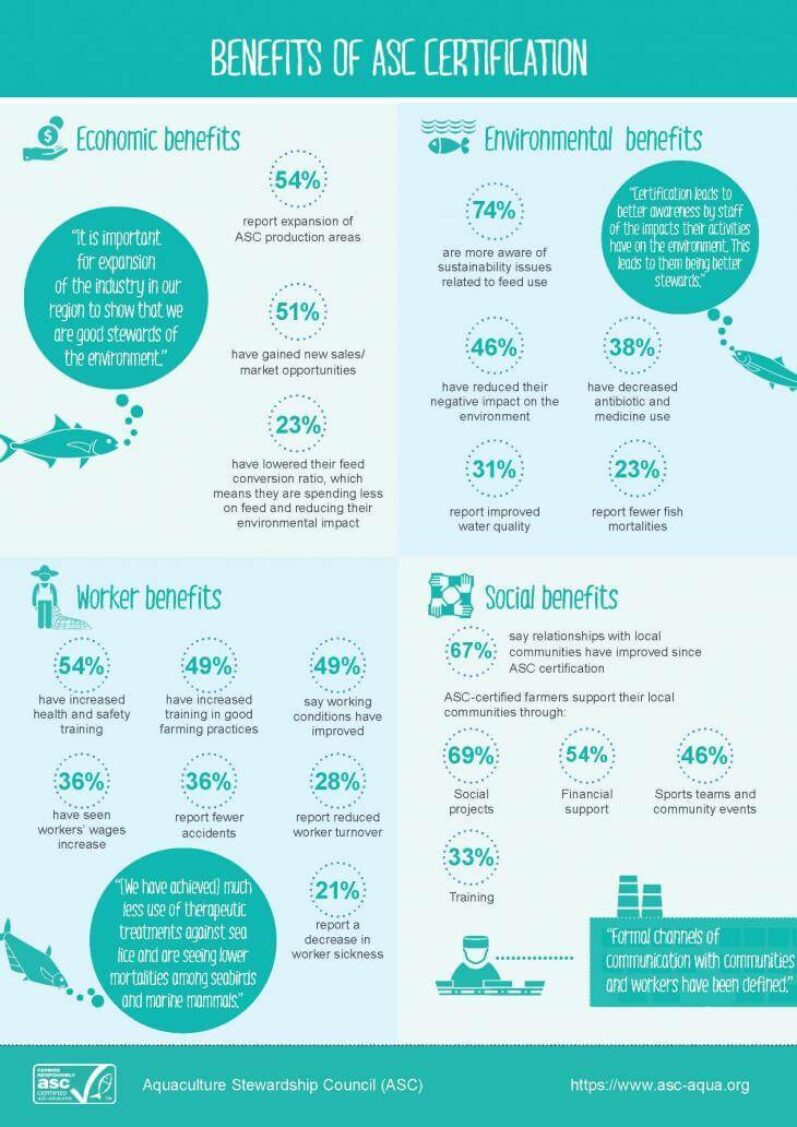
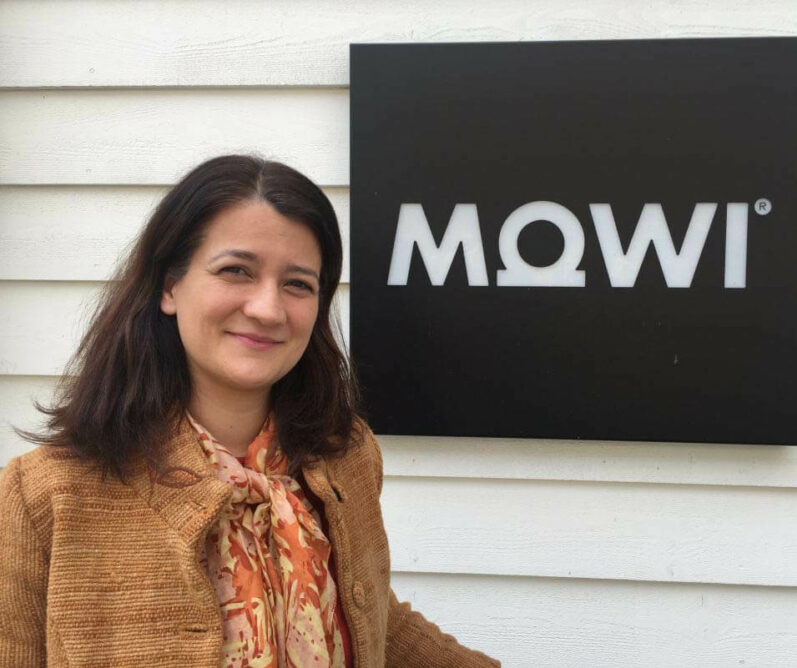
The role of certification in the future
Catarina Martins, Chief Sustainability Officer, Mowi ASA
With the growing attention on where our food comes from and how it’s produced, it’s promising to see an increase in demand for products that are responsibly produced. However, the rapid rise in demand for sustainable food that is healthy, such as farm-raised salmon, presents some unique challenges. The faster our industry grows, the greater its potential impact on the environment, which is why we must ensure the growth of the salmon farming industry is managed responsibly. By working in partnership with a science-based certification scheme like ASC, we are better positioned to ensure sustainable growth that in turn produces sufficient food, while protecting ocean ecosystems.
We also believe that ASC certification has an important role in educating people about how the seafood we buy to cook at home, the meals we eat in restaurants, and the other food choices we make every day can contribute to the health and future of our planet. A big part of certification is to build trust in our product and our salmon farming processes. It’s our hope that by seeing the ASC logo, this will give consumers the confidence they may have previously lacked to pick up a pack of seafood and know and trust that they’re buying something good for themselves and for the environment. We still need to do more, though, to ensure people are fully aware of sustainable seafood options and the benefits of purchasing certified fish. Recent research in Europe has shown that consumers are becoming more aware in this regard – with 88% of French consumers believing it’s important for supermarkets to provide responsibly sourced farmed seafood. We hope we can continue to drive this awareness in other markets to help promote sustainable seafood and, in turn, help the environment by rewarding responsible salmon farmers. We still have some way to go to reach our 100% certification goal, but by setting this target we are pleased to be moving in the right direction, and through the collaborative approach to achieving certification within the GSI membership, we believe responsible salmon farming can continue to play a key role in providing a healthy and sustainable protein option to global consumers. With a low carbon footprint, high protein retention and efficient feed conversion ratio, farmed salmon can contribute a healthy- and climate-friendly protein source to the world’s food needs.
“As a global certification scheme, our mission is to drive the transformative change needed to ensure aquaculture is and continues to be a responsible and sustainable production system with minimal environmental impact. Certification schemes are often challenged for either setting the bar too low or for only moving the top performers, but through the GSI’s ambitious commitment to ASC they are demonstrating that it is possible to move large proportions of an industry sector towards the highest levels of responsible production and increase the availability for sustainably farmed salmon for the global marketplace”.Chris Ninnes, ASC CEO.
